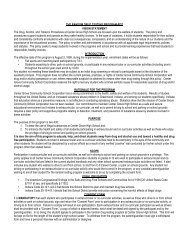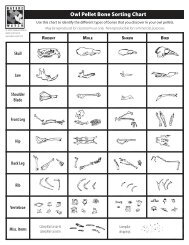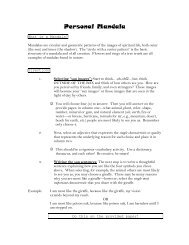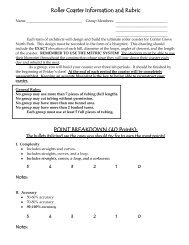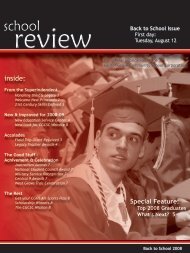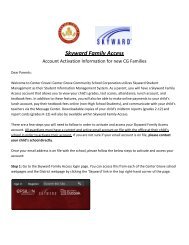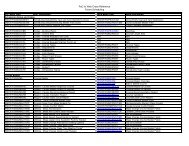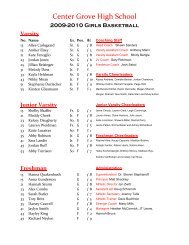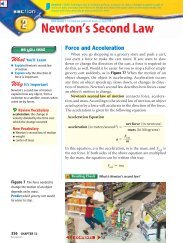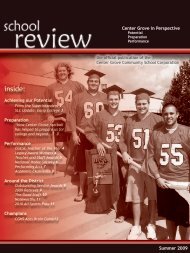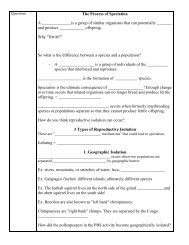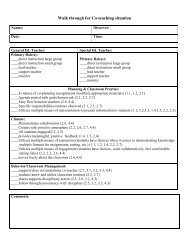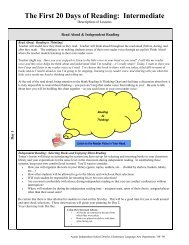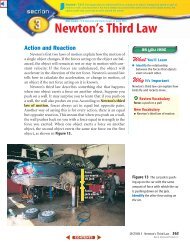Fall/Winter 2008-09 Issue - Center Grove Community School ...
Fall/Winter 2008-09 Issue - Center Grove Community School ...
Fall/Winter 2008-09 Issue - Center Grove Community School ...
Create successful ePaper yourself
Turn your PDF publications into a flip-book with our unique Google optimized e-Paper software.
election <strong>2008</strong><br />
welcome new board members<br />
November 4, <strong>2008</strong> was a truly historical election day. In the<br />
shadow of all the national excitement, <strong>Center</strong> <strong>Grove</strong> is fortunate<br />
to have elected two dedicated community<br />
members to our Board of <strong>School</strong> Trustees.<br />
Welcome to Carole Tumey and John Steed, who<br />
will take office on January 1, 20<strong>09</strong>. Both have<br />
long standing connections to <strong>Center</strong> <strong>Grove</strong>, as<br />
Tumey spent 40 years employed by the district as<br />
a teacher, coach, and assistant athletics director.<br />
She retired in 2003. Steed is a former school<br />
board member, having served from 1993 until<br />
2003.<br />
Tumey and Steed will replace current board<br />
member Jackie Ponder and President Matt<br />
Carol S. Tumey<br />
(Photo of Steed not available)<br />
Shepherd who did not run for reelection. We want to thank both<br />
Mrs. Ponder and Mr. Shepherd for their tireless dedication and<br />
service to the <strong>Center</strong> <strong>Grove</strong> school board throughout<br />
their terms, and we are confident that we can count<br />
on their continued support and interest in our school<br />
district after their official service is completed. Their<br />
many contributions and valuable insight are such an<br />
asset to our community, and we very much appreciate<br />
the significant time and effort they have provided as<br />
school board members.<br />
According to school board policy, the annual Board<br />
Organization Meeting will be held on or before January<br />
15, 20<strong>09</strong> to select officers.<br />
The New 3 R’s, continued from page 3<br />
create an environment where students achieve<br />
at a higher level and rarely fall through the<br />
cracks. Students in smaller schools are more<br />
motivated, have higher attendance rates, feel<br />
safer, and graduate and attend college in higher<br />
numbers.”<br />
Our goal at CGHS is for at least one<br />
adult to know each student well. We want<br />
student contact with adults to be positive<br />
and encouraging. We don’t want our kids to<br />
only hear, “Don’t do that,” from teachers and<br />
administrators at school. To accomplish this<br />
goal, our extensive research and observation<br />
has led us to the recommendation of creating<br />
smaller learning communities.<br />
“The point about relationships<br />
is that learning is<br />
personal. When students<br />
have strong, trusting<br />
relationships with their<br />
teachers, they work harder<br />
and achieve more.”<br />
– Willard Daggett<br />
Our efforts to meet the “personal”<br />
mandate began with the implementation of a<br />
90-minute Instructional Resource Period, or<br />
IRP. This worked exceptionally well for some<br />
departments, but not for others.<br />
To improve these efforts, mandatory study<br />
hall for each student was implemented, and<br />
IRP was replaced with a 30-minute STaR<br />
(Students, Teachers and Relationships) period.<br />
STaR classes are designed to be small, with<br />
about 15-16 in this year’s freshman classes.<br />
Three days a week, students have open STaR<br />
periods, during which they can meet with<br />
teachers to get help if they need it. Thursdays<br />
are closed STaRs, allowing teachers and<br />
students to work on relationships.<br />
With the implementation of smaller<br />
learning communities, students will likely<br />
have a mixed grade level and/or interest based<br />
advisory period. “This is where we believe<br />
relationships will be nurtured, as adults learn<br />
the aptitude, interests, and personalities of the<br />
students in their communities,” said Mr. Buck.<br />
Built in tutoring and mentoring opportunities<br />
are also expected to result.<br />
Upon this relational foundation, relevance<br />
will then help to engage students in their<br />
education by making real-world connections<br />
like community service, service learning<br />
projects, internships, and mentoring. We<br />
will involve our community members and<br />
businesses in the shift toward project and<br />
problem based learning.<br />
“The more students<br />
understand how what they<br />
are learning is relevant to<br />
them, to their community,<br />
or to the world at large;<br />
the more motivated they<br />
will be to learn.”<br />
– Willard Daggett<br />
This will start with New Tech High and<br />
Early College, then the other SLC’s will follow<br />
suit. This will allow students the opportunity<br />
to collaborate, produce, and present to the<br />
community and parents, thereby externalizing<br />
the enemy, or placing the teacher on the same<br />
side with the student.<br />
Relationships and relevance will bring us<br />
to the rigor piece; these engaged students will<br />
be equipped to meet academic standards and<br />
state requirements. We are also making sure<br />
that students take the right test, the ACT or<br />
the SAT. This will make our students college<br />
eligible. By shifting from teaching to learning,<br />
with teachers accountable to ensure the<br />
students master the instruction, they will also<br />
be college ready.<br />
“We are gearing our<br />
curriculum to make college<br />
an option for every student…<br />
by equipping kids with 21 st<br />
Century Skills.”<br />
– Paul Buck<br />
At Indiana University, about 33,000<br />
applications are made for 7,000 freshman slots.<br />
According to Dr. Connelly in his book, College<br />
Knowledge, “High schools do a good job of<br />
making students college eligible, but a poor<br />
job of making them college knowledgeable, or<br />
ready.”<br />
We want CGHS graduates to be as versatile<br />
as possible, explains Mr. Buck. “We are gearing<br />
our curriculum to make college an option<br />
for every student, even those who don’t go<br />
immediately following high school graduation.<br />
By equipping kids with 21 st Century Skills,<br />
whenever the light bulb comes on, they will be<br />
ready to go back to school,” he said.<br />
Page 7 <strong>Fall</strong>/<strong>Winter</strong> <strong>2008</strong>-<strong>09</strong>




